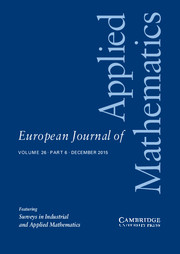Crossref Citations
This article has been cited by the following publications. This list is generated based on data provided by Crossref.
Orlovsky, D. G.
and
Piskarev, S. I.
2018.
On Approximation of Coefficient Inverse Problems for Differential Equations in Functional Spaces.
Journal of Mathematical Sciences,
Vol. 230,
Issue. 6,
p.
823.
Bao, Gang
Hu, Guanghui
Kian, Yavar
and
Yin, Tao
2018.
Inverse source problems in elastodynamics.
Inverse Problems,
Vol. 34,
Issue. 4,
p.
045009.
Hu, Guanghui
Kian, Yavar
Li, Peijun
and
Zhao, Yue
2019.
Inverse moving source problems in electrodynamics.
Inverse Problems,
Vol. 35,
Issue. 7,
p.
075001.
Krishnan, Venkateswaran P.
and
Vashisth, Manmohan
2020.
An inverse problem for the relativistic Schrödinger equation with partial boundary data.
Applicable Analysis,
Vol. 99,
Issue. 11,
p.
1889.
Hu, Guang-hui
Kian, Yavar
and
Zhao, Yue
2020.
Uniqueness to Some Inverse Source Problems for the Wave Equation in Unbounded Domains.
Acta Mathematicae Applicatae Sinica, English Series,
Vol. 36,
Issue. 1,
p.
134.
Mishra, Rohit Kumar
and
Vashisth, Manmohan
2021.
Determining the time-dependent matrix potential in a wave equation from partial boundary data.
Applicable Analysis,
Vol. 100,
Issue. 16,
p.
3492.
Liu, Boya
Saksala, Teemu
and
Yan, Lili
2024.
Partial Data Inverse Problem for Hyperbolic Equation with Time-Dependent Damping Coefficient and Potential.
SIAM Journal on Mathematical Analysis,
Vol. 56,
Issue. 4,
p.
5678.

